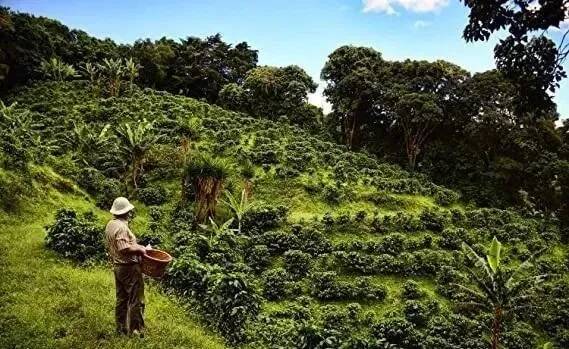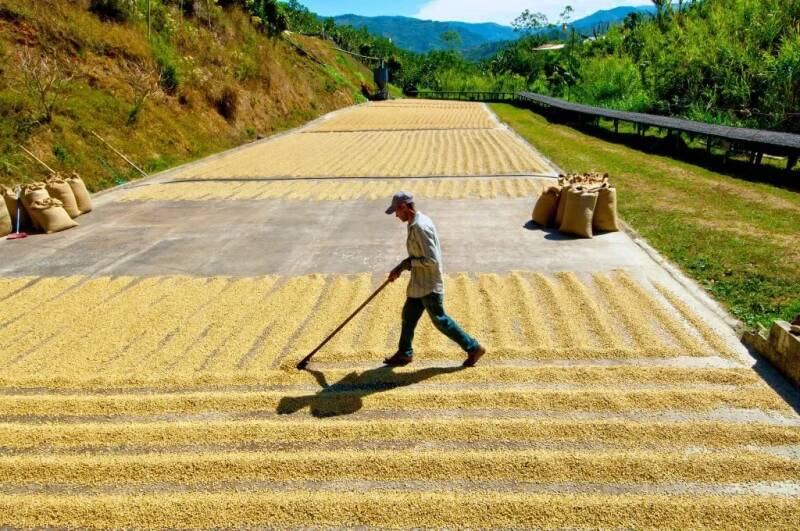Multiple impacts on exchange rate climate and economy! Costa Rica's coffee industry declines
It is understood that Costa Rica's economy is based on coffee production and is famous for its rich coffee tradition and high-quality coffee beans. But now Costa Rica's coffee industry is affected by a lot of problems.

At present, the Costa Rican coffee industry is mainly affected by exchange rate problems, changing government policies, labor shortages and competition in other American countries, which have led to the continuous decline of the coffee industry for many years. Coffee production has dropped from 3.5 million bags (60 kg / bag) in the 1990s to 1.7 million bags (60 kg / bag) today.
Costa Rica's economy has been growing steadily over the past 25 years, with tourism as the better sector, as well as the pharmaceutical and IT sectors. In 2017, Costa Rica's services accounted for 44.5% of domestic economic output, and despite the outbreak, economic output remained strong.
Moreover, many multinational companies are very willing to recruit employees in Costa Rica. As a result, some people in the industry have pointed out that the children of many coffee farmers now have more job options, and from an income point of view, other industries are more attractive than coffee cultivation. It can be said that Costa Rica is more focused on the development of the service industry, agriculture has been in a secondary position.
In addition, weather changes affect the production and quality of coffee in the country, while geopolitics exacerbate prices such as fertiliser and increase planting costs. Another challenge, however, is labour shortage. in the past, migrants and refugees accounted for 10 per cent of Costa Rica's population, and these migrants could do some harvesting, planting and pruning in rural areas. However, the new immigration policy introduced by the government and the intensification of demographic changes have led to labor shortages.

According to local rural owners, most people from Nicaragua have emigrated to the United States, and many do not want to stay in Costa Rica for seasonal labor. Some farms are well equipped, provide food and accommodation, and are even willing to pay twice the wage, but it is still difficult to hire workers.
At present, there are two voices about the future of the Costa Rican coffee industry. On the one hand, it is believed that the coffee industry still has great potential. If there is more investment and support, the coffee industry can solve the current difficulties and flourish.
However, others believe that with the development and changes of the global coffee market, the Costa Rican coffee industry is at risk of falling behind, especially small farmers and some traditional coffee-producing areas.
In this regard, industry insiders said that mainly the Costa Rican government believes that the coffee industry is not as important as it used to be, and has shifted its focus from agriculture to other economic development. As a result, some large coffee factories face losses, and Costa Rica may end up becoming a small but valuable coffee producer, like neighboring Panama.
Important Notice :
前街咖啡 FrontStreet Coffee has moved to new addredd:
FrontStreet Coffee Address: 315,Donghua East Road,GuangZhou
Tel:020 38364473
- Prev

Jamaica| Introduction to Blue Mountain No. 1 Coffee in Coffee Production Area
When talking about coffee in Jamaica, many people will think of the well-known Blue Mountain coffee, which comes from North America, an island country in the Caribbean Sea, Jamaica. The country covers an area of 10991 square kilometers and is the third largest island in the Caribbean. The country is divided into 3 counties,
- Next

Why is the coffee made at home not as good as the coffee in the shop? What details should I pay attention to when cooking by hand?
Most of my friends drink a good bean at Qianjie Store, so they will buy the same bean directly, so that they can enjoy the same delicious food in order to go home. As a result, the coffee brewed at home is completely different from the coffee drunk at the front street store. Then I will ask Qian Jie online or offline again: "Why rush at home?"
Related
- What grade does Jamaica Blue Mountain No. 1 coffee belong to and how to drink it better? What is the highest grade of Blue Mountain coffee for coffee aristocrats?
- What are the flavor characteristics of the world-famous coffee Blue Mountain No. 1 Golden Mantelin? What are the characteristics of deep-roasted bitter coffee?
- Can I make coffee a second time in an Italian hand-brewed mocha pot? Why can't coffee be brewed several times like tea leaves?
- Hand-brewed coffee flows with a knife and a tornado. How to brew it? What is the proportion of grinding water and water temperature divided into?
- What is the difference between Indonesian Sumatra Mantinin coffee and gold Mantinin? How to distinguish between real and fake golden Mantelin coffee?
- What does bypass mean in coffee? Why can hand-brewed coffee and water make it better?
- Unexpected! Ruixing Telunsu lattes use a smoothie machine to foam milk?!
- % Arabia's first store in Henan opens into the village?! Netizen: Thought it was P's
- Does an authentic standard mocha coffee recipe use chocolate sauce or powder? Mocha Latte/Dirty Coffee/Salty Mocha Coffee Recipe Share!
- What is the difference between Vietnam egg coffee and Norway egg coffee? Hand-brewed single product coffee filter paper filter cloth filter flat solution!

